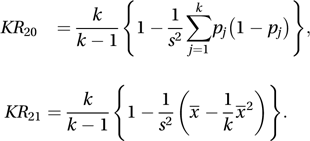The sampling variance of a statistic. For example, the reliability of
is σ2/n where σ2 = Var (X), so, as the sample size increases, becomes a better estimator in the sense that the variability decreases.
A measure of the confidence that we can have in the results obtained from a psychological test. A key question is whether the variability in the scores obtained by different individuals is due to real differences between the individuals or to chance variations resulting from inadequacies in the testing process. The ratio
 is the reliability index and its square root is the reliability coefficient. The true scores are unknown, but the coefficient can be estimated by using repeat tests. Suppose n individuals are given k similar tests. Let xm be the total score obtained by individual m over the k tests and let x̄ and s2 be the mean and variance, respectively, of x1, x2,…, xn. If each test consists of a single question for which an answer is either correct or incorrect, then let pj represent the proportion of correct answers to question j. Alternatively, if a variety of scores are possible on test j, let s2j be the variance of those obtained. An approximation to the reliability coefficient is provided by Cronbach’s alpha, given by
is the reliability index and its square root is the reliability coefficient. The true scores are unknown, but the coefficient can be estimated by using repeat tests. Suppose n individuals are given k similar tests. Let xm be the total score obtained by individual m over the k tests and let x̄ and s2 be the mean and variance, respectively, of x1, x2,…, xn. If each test consists of a single question for which an answer is either correct or incorrect, then let pj represent the proportion of correct answers to question j. Alternatively, if a variety of scores are possible on test j, let s2j be the variance of those obtained. An approximation to the reliability coefficient is provided by Cronbach’s alpha, given by  and other approximations are provided by the Kuder–Richardson formulae KR20 and KR21 (named after the equation numbers in Kuder and Richardson's 1937 paper):
and other approximations are provided by the Kuder–Richardson formulae KR20 and KR21 (named after the equation numbers in Kuder and Richardson's 1937 paper):  An alternative approach is the split-half method, in which each test provides two scores (for example, the score on the even questions and the score on the corresponding odd questions). Let r be the correlation coefficient between the scores obtained on the odd questions and the scores obtained on the even questions. The Spearman–Brown formula measures the reliability as
An alternative approach is the split-half method, in which each test provides two scores (for example, the score on the even questions and the score on the corresponding odd questions). Let r be the correlation coefficient between the scores obtained on the odd questions and the scores obtained on the even questions. The Spearman–Brown formula measures the reliability as 
See also test-retest reliability.
The statistical chance of a system, process, item of equipment, performing its intended purpose or function without failure or within required levels of performance.
1. The ability of a computer system to perform its required functions for a given period of time. It is often quoted in terms of percentage of uptime, but may be more usefully expressed as MTBF (mean time between failures). See also hardware reliability, repair time.
2. (of software) See software reliability.
The ability of a network to deliver particular service levels and its ability to be error-free.
The ability of any device, component, or circuit to perform a required function under stated conditions for a stated period of time. This may be expressed as a probability. (‘Time’ may be considered as distance, cycles, or other appropriate units.) Reliability characteristics are those quantities used to express reliability in numerical terms. Electronic items are usually approached from the viewpoint of failure, because of their extremely high reliability.
- space participant
- Space Physics Data Facility
- spaceport
- space probe
- space programme
- space qualified
- space quantization
- space race
- Space Radar Laboratory
- spacer DNA
- space reddening
- space-reflection symmetry
- space research
- Space Science Board
- Space Science Data Operations Office
- Space Services Inc.
- SpaceShipOne
- space shuttle
- space shuttle main engine
- space sickness
- space simulator
- space station
- spacesuit
- Space Task Group
- Space Technology Research Vehicle